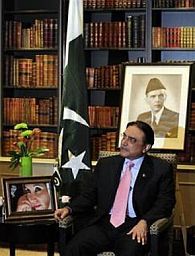 Asif Ali Zardari is expected to leave Pakistan after completing his term as President on September 8 due to security threats and fears about the reopening of graft cases, according to a media report on Sunday.
Asif Ali Zardari is expected to leave Pakistan after completing his term as President on September 8 due to security threats and fears about the reopening of graft cases, according to a media report on Sunday.
Zardari's friends have advised him to leave Pakistan because of "serious threats to his life", the report on the website of the Dawn newspaper quoted sources close to the President as saying.
Another "core reason" that could force Zardari to leave the country is corruption cases pending against him, the sources said.
The Supreme Court has already heard a case about reopening graft cases against Zardari in Switzerland.
Zardari's legal aides are aware that presidential immunity will not be available to him once he completes his term in September.
The recent assassination in Karachi of Zardari's chief security officer Bilal Sheikh was a wake up call for the President and his family. Once Zardari steps down as President, extensive security will not be provided to him and this could leave him and his family "extremely vulnerable", the report said.
Earlier, Khalid Shahenshah, the chief security officer of Zardari's private residence in Karachi, was killed outside his home in 2008. In 2011, Imran Jangi, another prominent security officer of the Bhutto family, was gunned down in Karachi.
“Look at the President’s public appearances in the last five years. Very rare. He prefers to live in his bunker. Now after losing all presidential privileges he will not stay in Pakistan,” said an unnamed Pakistan People’s Party leader.
Once Zardari steps down, he can no longer claim immunity under the constitution in corruption cases.
“The immunity under the Constitution is not for the person but for the constitutional office that the President is holding so he has immunity until he is in the office of the president,” said Aitzaz Ahsan, a senior PPP leader and one of Pakistan's top lawyers.
The report said Zardari could move abroad for an indefinite period. Zardari has already told the media he has no plans to contest the next presidential polls.
“And why should he? We are not even having a candidate to run for the office of President,” presidential spokesman Farhatullah Babar said. However, Babar did not respond to queries regarding speculation about Zardari's future plans.
The balance of power drastically shifted in favour of the PML-N after the May 11 general election. The PML-N now enjoys an absolute majority in the Electoral College comprising the two houses of parliament and the four provincial assemblies.
A PPP insider said Zardari would be "remote controlling" the party from abroad. Meanwhile, he intends to let his son, Bilawal Bhutto Zardari, take full control of the PPP.





